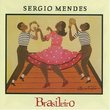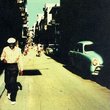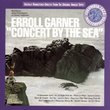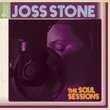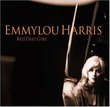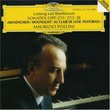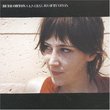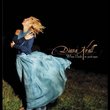| All Artists: Wolfgang Amadeus Mozart, Vladimir Horowitz Title: Mozart: Piano Sonatas KV. 281/KV. 330/KV. 333/Rondo, KV. 485/Adagio, KV. 540 Members Wishing: 0 Total Copies: 1 Label: Deutsche Grammophon Release Date: 3/14/1995 Genre: Classical Styles: Forms & Genres, Sonatas, Historical Periods, Classical (c.1770-1830), Modern, 20th, & 21st Century Number of Discs: 1 SwapaCD Credits: 1 UPC: 028944551723 |
Search - Wolfgang Amadeus Mozart, Vladimir Horowitz :: Mozart: Piano Sonatas KV. 281/KV. 330/KV. 333/Rondo, KV. 485/Adagio, KV. 540
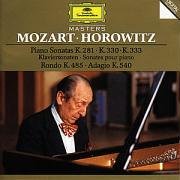 | Wolfgang Amadeus Mozart, Vladimir Horowitz Mozart: Piano Sonatas KV. 281/KV. 330/KV. 333/Rondo, KV. 485/Adagio, KV. 540 Genre: Classical
No Description Available. Genre: Classical Music Media Format: Compact Disk Rating: Release Date: 14-MAR-1995 ![header=[] body=[This CD is available to be requested as disc only.]](/images/attributes/disc.png?v=15401716) ![header=[] body=[This CD is unavailable to be requested with the disc and back insert at this time.]](/images/attributes/greyed_disc_back.png?v=15401716) ![header=[] body=[This CD is available to be requested with the disc and front insert.]](/images/attributes/disc_front.png?v=15401716) ![header=[] body=[This CD is unavailable to be requested with the disc, front and back inserts at this time.]](/images/attributes/greyed_disc_front_back.png?v=15401716) |
Larger Image |
CD DetailsSynopsis
Product Description No Description Available. Genre: Classical Music Media Format: Compact Disk Rating: Release Date: 14-MAR-1995 Similarly Requested CDs
|
CD ReviewsA PIONEER DAVID BRYSON | Glossop Derbyshire England | 05/15/2004 (5 out of 5 stars) "There was a lot more to Horowitz than virtuosity. Some of the loveliest lyric playing I have ever heard in my life I have heard from Horowitz. Furthermore, he was a pioneer in bringing the sonatas of Mozart and Haydn before the concert-going public. Some players of Horowitz's generation more commonly associated than he was with the Viennese masters were surprisingly shy in this respect - for instance I never heard of Serkin playing a Mozart sonata in public or on record although he played all the concertos.The five performances here apparently come from the last years of the great man's career. I have a number of other discs from him at this period, and this is the one that I like, slightly to my own surprise, easily the best. What endears this record to me is the sense of spontaneity and enthusiasm that I sense in the playing. Horowitz obviously loves this music. In his final years his touch lost some of its evenness, but that is no real problem this time. Stylistically, I feel that Horowitz was more certain of himself in Mozart than he was in Beethoven. There is not a single tempo in all the 11 tracks that I have any difficulty with. In terms of dynamics he does not see anything wrong with a biggish tone now and again, and I must say neither do I. In general the effect is proportionate without being prettified. There are some very interesting clips from him in the liner, and I took away two points in particular from him. First, it's hard to argue with his view that one can reproduce the effect of a fortepiano on a concert grand but not the other way about. Absolutely, and that is how he goes about things here, giving us restrained dynamics with the occasional glimpse of what the extra potential of a great 8-foot beast can add now and again. It reminded me of his memorable Scarlatti, using the concert grand to replicate a harpsichord in a way that Lipatti and Michelangeli and even Gould did not choose to do. His other specially intriguing remark relates to tempo rubato - he draws a pointed parallel between Chopin's famous rule that the left hand should keep strict time but the right had much more freedom and what appears to have been an astonishingly similar statement by Mozart himself. If the quotation had not been given, I think I would still have found his very disciplined rubato here both perfectly in keeping with Mozart's idiom and at the same time expressive. I found that the `andante amoroso' of the sonata K281 and the great B minor adagio K540 had a lot to say to me here. I sense that I may be lowering the 5-star bar just a little, but this is a player I love and this is a record I feel privileged to have found. There was nobody quite like Horowitz, and there is still some of the special and unique magic here." Master at work DAVID BRYSON | 06/19/2000 (4 out of 5 stars) "Horowitz was undoubtedly one of the best performer of the past century. This CD although does not fully demonstrate Horowitz's phenomenonal ability, listeners can still hear the crystalline clarity and brilliance in the fast movements, the pathos in the simple B minor adagio, the lyricism in the slow movements and too many other things to list. Mozart was not one of my favourite composers but Horowitz brings out all the subtlety in the simplicity of Mozart that gives the music so much more depth. (Although at times he sounds a bit too heavy handed for Mozart, but it's probably just a recording problem and who am I to criticise a master.) Any people out there who haven't heard Horowitz before, should definitely get this CD and also any CD with Horowitz playing Scriabin or Prokofiev." One of a Kind D. Jack Elliot | Omaha, Nebraska | 04/27/2001 (5 out of 5 stars) "This is a record on par with Gould's readings of the Bach Goldberg Variations, having at least as much to do with the performer as with the composer so that the whole is greater than the sum of the parts. Here you have Horowitz's Mozart, and not only Mozart - interpretations of a unique, sophisticated character. After hearing them you will hold each, Mozart and Horowitz, in higher regard."
|

 Track Listings (11) - Disc #1
Track Listings (11) - Disc #1